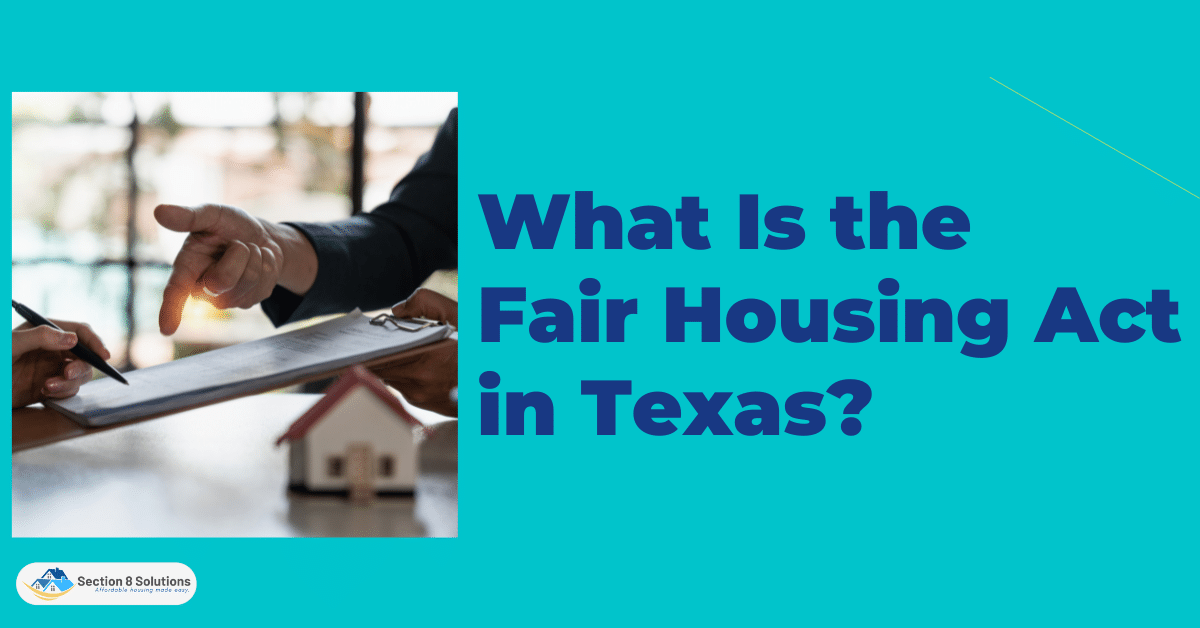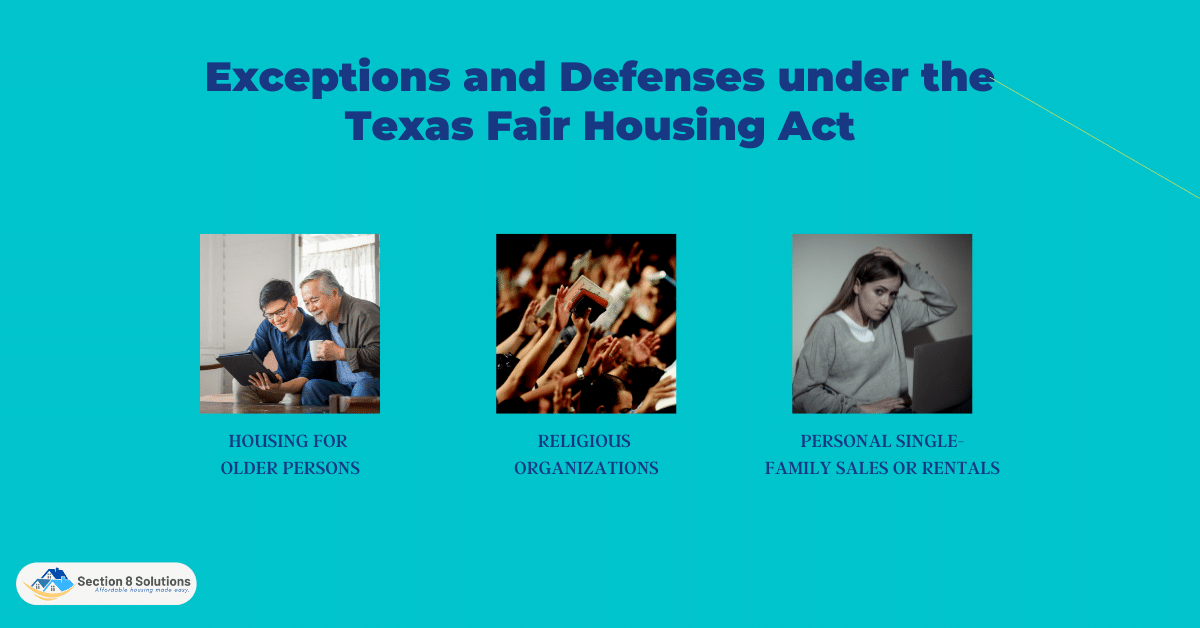Texas’ Fair Housing Act outlaws housing discrimination based on race, color, religion, sex, national origin, handicap, and family status. It ensures that individuals have equal opportunities in renting, buying, or financing housing. The Act promotes fair treatment and equal access to housing for all residents in Texas.
Throughout this blog, we will explore the key provisions of the Fair Housing Act in Texas, examine the prohibited forms of discrimination, and outline the enforcement mechanisms in place.

Historical Context and Overview of the Fair Housing Act
Redlining, racial covenants, and steering characterized US housing discrimination. Redlining kept non-white areas segregated by withholding banking services. Racial covenants deepened residential segregation. Race-based steering isolated minority groups.
Discriminatory policies had a profound impact on minority communities, leading to segregated neighborhoods and limited housing access. Redlining and racial covenants reinforced inequality, denying investment and essential services to marginalized groups. Segregation perpetuated economic disparities and educational disadvantages.
Discrimination included color, religion, sex, nationality, handicap, and family status. Religious organizations faced housing discrimination. Housing deals were sexist. National origin discrimination reduced ethnic housing alternatives. Disability hindered housing. Discrimination against families with children reduced their options.

Scope and Prohibited Discrimination under the Texas Fair Housing Act
The Texas Fair Housing Act provides comprehensive protections against discriminatory practices in housing, ensuring equal opportunities for all residents. The act prohibits various housing practices that are considered discriminatory, including:

- Refusal to Rent or Sell: It is unlawful for housing providers to refuse to rent or sell housing based on an individual’s protected characteristics, such as race, color, religion, sex, national origin, disability, or familial status.
- Unequal Terms and Conditions: Housing providers are prohibited from imposing different terms, conditions, or privileges on individuals based on their protected characteristics.
- Harassment or Intimidation: The Texas Fair Housing Act prohibits subjecting individuals to harassment, intimidation, or offensive conduct based on their protected characteristics. This includes unwelcome actions or behaviors that create a hostile environment or interfere with an individual’s enjoyment of their housing.
- Advertising Practices: It is unlawful to advertise housing in a way that indicates a preference, limitation, or discrimination based on protected characteristics. Housing advertisements must be inclusive and avoid any language or visuals that suggest a preference for or exclusion of certain groups.
- Retaliation: The Texas Fair Housing Act prohibits retaliating against individuals who exercise their fair housing rights or assist others in doing so.
It is important to note that this is not an exhaustive list, and the Texas Fair Housing Act covers a broader range of discriminatory practices. By prohibiting these discriminatory practices, the act aims to promote fair housing opportunities and foster inclusive communities throughout the state of Texas.
Enforcement and Remedies under the Texas Fair Housing Act
Enforcement and Remedies under the Texas Fair Housing Act provide a robust framework to protect individuals from housing discrimination and ensure their rights are upheld. The Texas Workforce Commission’s Civil Rights Division (TWCCRD) plays a crucial role in enforcing the act.
The enforcement mechanisms involve a comprehensive complaint process and thorough investigation procedures. When individuals file a complaint with the TWCCRD, it initiates an investigation that includes gathering evidence, conducting interviews, and assessing alleged discriminatory practices.
If a violation is found, victims of housing discrimination may be entitled to various remedies, including monetary damages to compensate for harm suffered, injunctive relief to prevent further discrimination, and the recovery of attorney’s fees and costs. These remedies serve as incentives for individuals to seek justice and promote fair housing practices throughout Texas.

Exceptions and Defenses under the Texas Fair Housing Act
The Texas Fair Housing Act recognizes certain exceptions and defenses that allow for specific housing practices under particular circumstances. These exceptions and defenses aim to balance the protection against discrimination with the recognition of certain legitimate interests. Here are a couple of notable exceptions and defenses under the Act:

Housing for Older Persons
The Act allows for housing communities that are designated specifically for older persons. These communities may impose age restrictions and provide services and amenities tailored to the needs of older individuals. To qualify for this exception, housing providers must meet specific criteria outlined in the Act, including compliance with the Housing for Older Persons Act (HOPA) and ensuring that at least 80% of the occupied units are occupied by at least one person who is 55 years of age or older.

Religious Organizations
As long as the housing is used for religious reasons, the Texas Fair Housing Act allows religious groups to give precedence to their own members when providing housing or associated services. Religious organizations are distinctive and may serve their religious group in their housing facilities.
These exceptions and defenses cannot be used to justify illegal discrimination. Housing providers must carefully follow the Act’s criteria and limits when implementing these exclusions and defenses.
Single-Family Homes Sold or Rented by Individuals
Owner-occupied structures with four or fewer units are free from the FHA. If you sell or rent a single-family house and live in one of the units as your main residence, do not employ discriminatory advertising, and possess no more than three such units, you may be excluded from some anti-discrimination requirements. When choosing renters or purchasers, don’t discriminate. Keep up with FHA restrictions and check state and local legislation for exemptions.
Please note that my information is based on the FHA as of September 2021, and there may have been updates or amendments since then. Consulting the specific laws in your jurisdiction or seeking legal advice is advisable for the latest information.

Conclusion
In conclusion, the Fair Housing Act in Texas serves as a crucial legislative framework that promotes fairness, equality, and inclusivity in housing. It addresses historical housing discrimination, protects individuals from various forms of discrimination, and provides mechanisms for enforcement and remedies.
By upholding the principles of fair housing, we can create communities where everyone has equal opportunities and access to safe and quality housing. It is essential for individuals to be aware of their rights under the Act and actively support efforts to eradicate housing discrimination.










